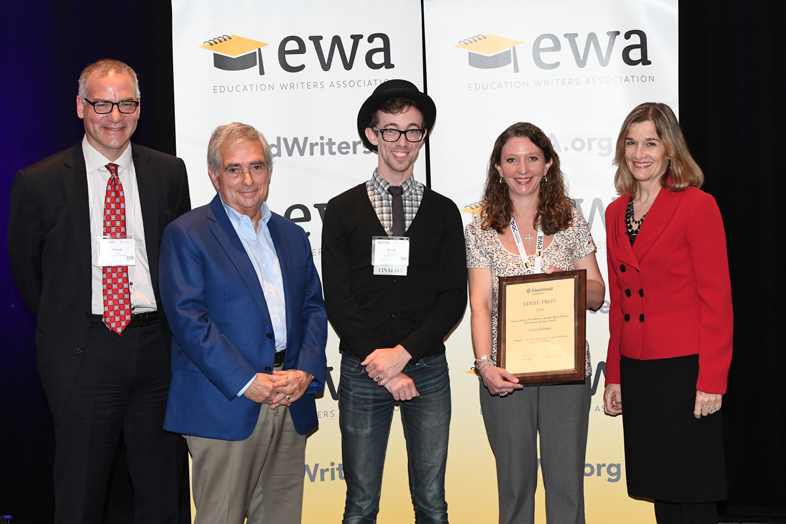
2018 Winners for the Hechinger, Moskowitz, Eddie Awards in Education Reporting
EWA is delighted to announce the major prize winners for the 2018 National Awards for Education Reporting.

EWA is delighted to announce the major prize winners for the 2018 National Awards for Education Reporting.
The Education Writers Association is delighted to honor Hannah Dreier with the top prize in the 2018 National Awards for Education Reporting.
This year’s Fred M. Hechinger Grand Prize for Distinguished Education Reporting will go to Dreier for “Casualties of a Crackdown: MS-13 on Long Island,” her deeply reported and beautifully written investigation into the fate of students caught up in a community’s effort to crack down on gangs. The piece was a joint project of ProPublica, New York Magazine and The New York Times Magazine.
Various judges described Dreier’s work as ”devastatingly effective,” “expertly reported,” “heartbreaking,” and “stunning.” One elaborated: “This remarkable ‘life and death’ story exposes the complicated relationship not just between schools and law enforcement but educators and troubled students. The reporter’s relentless work to document the harrowing experiences of two teenagers trapped in the violent world of MS-13 is eye-opening and tragic.”
The EWA grand prize, named for the late New York Times education editor Fred M. Hechinger, carries an award of $10,000.
Seven other journalists were also honored with premier prizes at the EWA’s 2019 National Seminar held in Baltimore and hosted by Johns Hopkins School of Education.
David Jesse of the Detroit Free Press was named the best education beat reporter in the country for his coverage of the Larry Nassar sexual assault scandal at Michigan State University, as well as other higher education news. Jesse won the EWA’s annual Ronald Moskowitz Prize for Outstanding Beat Reporting, named for the late California education journalist and EWA board member. This prize singles out one of the three winners of the EWA’s beat reporting category prizes — the best beat reporters in small, medium-sized and large newsrooms.
The judges praised Jesse’s “great accountability and investigative reporting.” They said Jesse’s stories were ”deeply reported and quite shocking” and provided “much-needed reporting that made a difference to local readers as well as nationally.” One judge added: “David Jesse did a lot of great digging here, revealing hypocrisy in how MSU handled allegations of sexual misconduct against a dean and the fallout of the Nassar sexual abuse cases.”
The Moskowitz prize, honoring a bequest to EWA upon Moskowitz’s death in 2013, comes with a $2,500 cash award.
The third major award, the Eddie Prize, was awarded to a team from The Post and Courier, of Charleston, S.C. The Edwin Gould Foundation created the Eddie Prize to recognize the best work on the challenges low-income students face completing college. Journalists Seanna Adcox, Paul Bowers, Jennifer Berry Hawes, Thad Moore and Glenn Smith won top honors in the Eddie competition for their piece “Minimally Adequate: How South Carolina’s Education System Fails Students.”
Several judges used the word “excellent” to characterize the project. One said it was an ”extremely impressive work, with a sweep of geography, history and politics.” Another called it a “fascinating and devastating account of the complex historical factors that drove South Carolina’s schools to the bottom of national rankings. This series exposes the racial and economic disparities that have marred South Carolina’s past and continue to plague the state.”
The winner of the Eddie Prize receives a bowler hat — the signature headwear of the late New York philanthropist Edwin Gould — as well as a $7,500 cash award.
On Monday, EWA’s judges named winners in 16 categories. The winners of those category awards were eligible for one of the two grand prizes. The Eddie Prize was selected from a separate group of entries. The 17 total winners represent the very best education journalism of 2018, having been culled from more than 400 entries.
The awards competition, an EWA tradition stretching back five decades, was independently judged in three rounds by more than 70 current and former editors and reporters.
“In a year marked by extraordinary education reporting, this year’s award winners exemplify the true ideals of our profession — holding those in power accountable, and shedding much-needed light on students and schools,” said Greg Toppo, president of the EWA Board of Directors. “We are honored to recognize their work.”
Your post will be on the website shortly.
We will get back to you shortly